Dionysius of Halicarnassus’ Roman Antiquities (14 vols.)
Digital Logos Edition
Overview
Dionysius of Halicarnassus wrote Roman Antiquities driven by the purpose of changing the way his people were seen by other cultures. Without a proper account of early Roman history, the Greeks ignored Rome’s noble roots and listened to baseless reports claiming that Rome was founded by homeless wanderers, barbarians, or slaves. Dionysius sought to reconcile Greek readers to Roman rule by providing a thorough and historically accurate account of early Roman history—an area that had been virtually untouched in other writings.
Roman Antiquities looked to prove that the founders of Rome were not nameless nomads, but actually Greeks from well-known tribes. He discusses the bravery and piety of the early Roman leaders who laid the groundwork for the great rulers of the present through the customs and institutions they passed on.
Dionysius proposed that all historians follow his example through two essential principles: choosing subjects that are noble, lofty, and useful enough to be worth writing about, as well as using the greatest care and discrimination to gather source materials. By these means, he acquired the best texts available to assemble one of the only two complete, detailed accounts of early Roman history in existence today.
This collection contains the complete texts in their Loeb Classical Library editions. Each text is included in its original Greek, with an English translation for easy side-by-side comparison. Logos’ language tools help you to go deeper into the Greek text and explore Dionysius’ elegant language. Use the dictionary lookup tool to examine difficult Greek words and find every use of the same word in your library. Students of history, ancient cultures, and literature will enjoy these works and appreciate their significance.

Key Features
- Loeb Classical Library editions
- The 11 complete surviving books of early Roman history by Dionysius
- Excerpts from books 12–20
Product Details
- Title: Dionysius of Halicarnassus’ Roman Antiquities (14 vols.)
- Author: Dionysius of Halicarnassus
- Editors: T. E. Page, E. Capps, W. H. D. Rouse, L. A. Post, and E. H. Warmington
- Translator: Earnest Cary
- Publisher: Harvard University Press
- Volumes: 14
- Pages: 2,963
Individual Titles
- The Roman Antiquities of Dionysius of Halicarnassus, vol. 1 translated by Earnest Cary
- The Roman Antiquities of Dionysius of Halicarnassus, vol. 2 translated by Earnest Cary
- The Roman Antiquities of Dionysius of Halicarnassus, vol. 3 translated by Earnest Cary
- The Roman Antiquities of Dionysius of Halicarnassus, vol. 4 translated by Earnest Cary
- The Roman Antiquities of Dionysius of Halicarnassus, vol. 5 translated by Earnest Cary
- The Roman Antiquities of Dionysius of Halicarnassus, vol. 6 translated by Earnest Cary
- The Roman Antiquities of Dionysius of Halicarnassus, vol. 7 translated by Earnest Cary
- The Roman Antiquities of Dionysius of Halicarnassus, vol. 1: Greek Text by Dionysius of Halicarnassus
- The Roman Antiquities of Dionysius of Halicarnassus, vol. 2: Greek Text by Dionysius of Halicarnassus
- The Roman Antiquities of Dionysius of Halicarnassus, vol. 3: Greek Text by Dionysius of Halicarnassus
- The Roman Antiquities of Dionysius of Halicarnassus, vol. 4: Greek Text by Dionysius of Halicarnassus
- The Roman Antiquities of Dionysius of Halicarnassus, vol. 5: Greek Text by Dionysius of Halicarnassus
- The Roman Antiquities of Dionysius of Halicarnassus, vol. 6: Greek Text by Dionysius of Halicarnassus
- The Roman Antiquities of Dionysius of Halicarnassus, vol. 7: Greek Text by Dionysius of Halicarnassus
This title is included in the following collections
You can save when you purchase this product as part of a collection.
Loeb Classical Library Builder...
$1,269.18$508.99Logos 10 Lutheran Diamond Libr...
$2,999.99$2,099.99Logos 10 Lutheran Portfolio Li...
$4,749.99$3,324.99Logos 10 Messianic Jewish Port...
$4,749.99$3,324.99
- $3,413.99
- $12,102.39$7,299.99
- $23,999.99
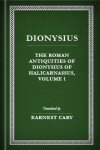
The Roman Antiquities of Dionysius of Halicarnassus, vol. 1
- Author: Dionysius of Halicarnassus
- Editors: T. E. Page, E. Capps, W. H. D. Rouse, L. A. Post, and E. H. Warmington
- Translator: Earnest Cary
- Publisher: Harvard University Press
- Publication Date: 1937
- Pages: 320
This volume contains an introduction with biographical information about Dionysius of Halicarnassus, Earnest Cary’s translation of books one and two, and an index.
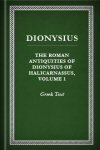
The Roman Antiquities of Dionysius of Halicarnassus, vol. 1: Greek Text
- Author: Dionysius of Halicarnassus
- Editors: T. E. Page, E. Capps, W. H. D. Rouse, L. A. Post, and E. H. Warmington
- Translator: Earnest Cary
- Publisher: Harvard University Press
- Publication Date: 1937
- Pages: 274
This volume contains the Greek text of books one and two.
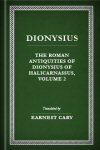
The Roman Antiquities of Dionysius of Halicarnassus, vol. 2
- Author: Dionysius of Halicarnassus
- Editors: T. E. Page, E. Capps, W. H. D. Rouse, L. A. Post, and E. H. Warmington
- Translator: Earnest Cary
- Publisher: Harvard University Press
- Publication Date: 1939
- Pages: 266
This volume contains Earnest Cary’s translation of books three and four, and an index.
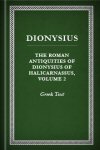
The Roman Antiquities of Dionysius of Halicarnassus, vol. 2: Greek Text
- Author: Dionysius of Halicarnassus
- Editors: T. E. Page, E. Capps, W. H. D. Rouse, L. A. Post, and E. H. Warmington
- Translator: Earnest Cary
- Publisher: Harvard University Press
- Publication Date: 1939
- Pages: 266
This volume contains the Greek text of books 3 and 4.
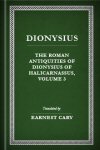
The Roman Antiquities of Dionysius of Halicarnassus, vol. 3
- Author: Dionysius of Halicarnassus
- Editors: T. E. Page, E. Capps, W. H. D. Rouse, L. A. Post, and E. H. Warmington
- Translator: Earnest Cary
- Publisher: Harvard University Press
- Publication Date: 1940
- Pages: 194
This volume contains Earnest Cary’s translation of book five, the first half of book six, and an index.
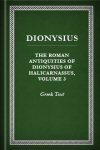
The Roman Antiquities of Dionysius of Halicarnassus, vol. 3: Greek Text
- Author: Dionysius of Halicarnassus
- Editors: T. E. Page, E. Capps, W. H. D. Rouse, L. A. Post, and E. H. Warmington
- Translator: Earnest Cary
- Publisher: Harvard University Press
- Publication Date: 1940
- Pages: 193
This volume contains the Greek text of book five and the first half of book six.
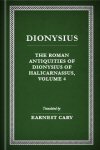
The Roman Antiquities of Dionysius of Halicarnassus, vol. 4
- Author: Dionysius of Halicarnassus
- Editors: T. E. Page, E. Capps, W. H. D. Rouse, L. A. Post, and E. H. Warmington
- Translator: Earnest Cary
- Publisher: Harvard University Press
- Publication Date: 1943
- Pages: 163
This volume contains Earnest Cary’s translation of the second half of book six, all of book seven, and an index.
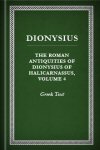
The Roman Antiquities of Dionysius of Halicarnassus, vol. 4: Greek Text
- Author: Dionysius of Halicarnassus
- Editors: T. E. Page, E. Capps, W. H. D. Rouse, L. A. Post, and E. H. Warmington
- Translator: Earnest Cary
- Publisher: Harvard University Press
- Publication Date: 1943
- Pages: 162
This volume contains the Greek text of the second half of book six and all of book seven.
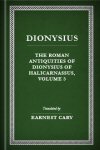
The Roman Antiquities of Dionysius of Halicarnassus, vol. 5
- Author: Dionysius of Halicarnassus
- Editors: T. E. Page, E. Capps, W. H. D. Rouse, L. A. Post, and E. H. Warmington
- Translator: Earnest Cary
- Publisher: Harvard University Press
- Publication Date: 1945
- Pages: 139
This volume contains Earnest Cary’s translation of book eight, the first 24 chapters of book nine, and an index.
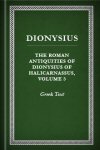
The Roman Antiquities of Dionysius of Halicarnassus, vol. 5: Greek Text
- Author: Dionysius of Halicarnassus
- Editors: T. E. Page, E. Capps, W. H. D. Rouse, L. A. Post, and E. H. Warmington
- Translator: Earnest Cary
- Publisher: Harvard University Press
- Publication Date: 1945
- Pages: 138
This volume contains the Greek text of book eight and the first 24 chapters of book nine.
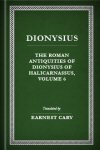
The Roman Antiquities of Dionysius of Halicarnassus, vol. 6
- Author: Dionysius of Halicarnassus
- Editors: T. E. Page, E. Capps, W. H. D. Rouse, L. A. Post, and E. H. Warmington
- Translator: Earnest Cary
- Publisher: Harvard University Press
- Publication Date: 1947
- Pages: 190
This volume contains Earnest Cary’s translation of the remaining 50 chapters of book nine, all of book ten, and an index.
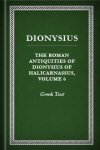
The Roman Antiquities of Dionysius of Halicarnassus, vol. 6: Greek Text
- Author: Dionysius of Halicarnassus
- Editors: T. E. Page, E. Capps, W. H. D. Rouse, L. A. Post, and E. H. Warmington
- Translator: Earnest Cary
- Publisher: Harvard University Press
- Publication Date: 1947
- Pages: 188
This volume contains the Greek text of the remaining 50 chapters of book nine and all of book ten.
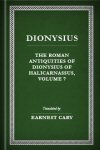
The Roman Antiquities of Dionysius of Halicarnassus, vol. 7
- Author: Dionysius of Halicarnassus
- Editors: T. E. Page, E. Capps, W. H. D. Rouse, L. A. Post, E. H. Warmington
- Translator: Earnest Cary
- Publisher: Harvard University Press
- Publication Date: 1950
- Pages: 235
This volume contains Earnest Cary’s translation of book 11, excerpts from books 12–20 of the translations by Adolf Gottlieb Kiessling and Karl Jacoby, and a general index to the collection.
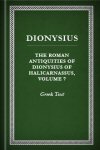
The Roman Antiquities of Dionysius of Halicarnassus, vol. 7: Greek Text
- Author: Dionysius of Halicarnassus
- Editors: T. E. Page, E. Capps, W. H. D. Rouse, L. A. Post, E. H. Warmington
- Translator: Earnest Cary
- Publisher: Harvard University Press
- Publication Date: 1950
- Pages: 235
This volume contains the Greek text of book 11 and excerpts from books 12–20 of the Greek manuscripts used by Adolf Gottlieb Kiessling and Karl Jacoby.
About Dionysius of Halicarnassus
Dionysius of Halicarnassus (c. 60–7 BC) was a Greek historian and teacher of rhetoric. He lived during the rule of the first Roman emperor, Caesar Augustus. For 22 years he studied Latin and taught the art of rhetoric. He pushed away from Aristotle’s concept of mimesis, which advocated for the imitation of nature, and embraced the notion of imitatio, which included the imitation of other authors. Imitatio was embraced by Latin orators and rhetoricians in place of Aristotle’s obsolete method. Dionysius of Halicarnassus’ other works include The Art of Rhetoric, The Arrangement of Words, On Imitation, Commentaries on the Attic Orators, On the Admirable Style of Demosthenes and On the Character of Thucydides.
About Earnest Cary
Earnest Cary earned his PhD from Harvard and went on to be an instructor at Princeton. He translated History of Rome by Dio Cassius.
Reviews
2 ratings

Allen Bingham
12/30/2014

Larry Proffitt (I
11/19/2014